
Learning theory describes how students receive, process, and retain knowledge during learning. Cognitive, emotional, and environmental influences, as well as prior experience, all play a part in how understanding, or a world view, is acquired or changed and knowledge and skills retained.
The philosophy of education is the branch of applied philosophy that investigates the nature of education as well as its aims and problems. It includes the examination of educational theories, the presuppositions present in them, and the arguments for and against them. It is an interdisciplinary field that draws inspiration from various disciplines both within and outside philosophy, like ethics, political philosophy, psychology, and sociology. These connections are also reflected in the significant and wide-ranging influence the philosophy of education has had on other disciplines. Many of its theories focus specifically on education in schools but it also encompasses other forms of education. Its theories are often divided into descriptive and normative theories. Descriptive theories provide a value-neutral account of what education is and how to understand its fundamental concepts, in contrast to normative theories, which investigate how education should be practiced or what is the right form of education.
A teaching method comprises the principles and methods used by teachers to enable student learning. These strategies are determined partly on subject matter to be taught and partly by the nature of the learner. For a particular teaching method to be appropriate and efficient it has take into account the learner, the nature of the subject matter, and the type of learning it is supposed to bring about.
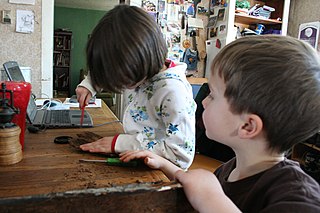
Unschooling is an informal learning that advocates learner-chosen activities as a primary means for learning. Unschoolers learn through their natural life experiences including play, household responsibilities, personal interests and curiosity, internships and work experience, travel, books, elective classes, family, mentors, and social interaction. Often considered a lesson- and curriculum-free implementation of homeschooling, unschooling encourages exploration of activities initiated by the children themselves, believing that the more personal learning is, the more meaningful, well-understood and therefore useful it is to the child. While courses may occasionally be taken, unschooling questions the usefulness of standard curricula, fixed times at which learning should take place, conventional grading methods in standardized tests, forced contact with children in their own age group, the compulsion to do homework, regardless of whether it helps the learner in their individual situation, the effectiveness of listening to and obeying the orders of one authority figure for several hours each day, and other features of traditional schooling in the education of each unique child.

John Caldwell Holt was an American author and educator, a proponent of homeschooling, and a pioneer in youth rights theory.
"Computing Machinery and Intelligence" is a seminal paper written by Alan Turing on the topic of artificial intelligence. The paper, published in 1950 in Mind, was the first to introduce his concept of what is now known as the Turing test to the general public.
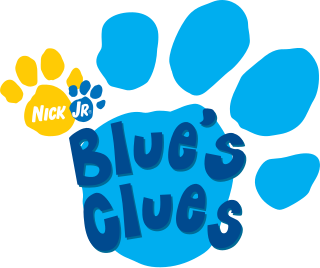
Blue's Clues is an American live-action/animated children's television series that premiered on Nickelodeon as part of its Nick Jr. block on September 8, 1996, and concluded its run on August 6, 2006. Producers/creators Angela Santomero, Todd Kessler, and Traci Paige Johnson combined concepts from child development and early-childhood education with innovative animation and production techniques that helped their viewers learn. The show was originally hosted by Steve Burns, who left in 2002 and was replaced by Donovan Patton as Joe for the rest of the series. The show follows an animated blue-spotted dog named Blue as she leaves a trail of clues/paw prints for the host and the viewers to figure out her plans for the day. Blue's Clues became the highest-rated show for preschoolers on American commercial television and was critical to Nickelodeon's growth. A spin-off called Blue's Room premiered in 2004. A revival of the series titled Blue's Clues & You! premiered on Nickelodeon on November 11, 2019.

Piaget's theory of cognitive development is a comprehensive theory about the nature and development of human intelligence. It was originated by the Swiss developmental psychologist Jean Piaget (1896–1980). The theory deals with the nature of knowledge itself and how humans gradually come to acquire, construct, and use it. Piaget's theory is mainly known as a developmental stage theory.
Founded in 1920, The National Council of Teachers of Mathematics (NCTM) is a professional organization for schoolteachers of mathematics in the United States. One of its goals is to improve the standards of mathematics in education. NCTM holds annual national and regional conferences for teachers and publishes five journals.
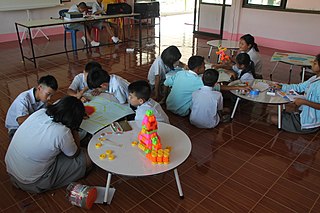
Project-based learning (PBL) is a student-centered pedagogy that involves a dynamic classroom approach in which it is believed that students acquire a deeper knowledge through active exploration of real-world challenges and problems. Students learn about a subject by working for an extended period of time to investigate and respond to a complex question, challenge, or problem. It is a style of active learning and inquiry-based learning. PBL contrasts with paper-based, rote memorization, or teacher-led instruction that presents established facts or portrays a smooth path to knowledge by instead posing questions, problems or scenarios.
A lesson plan is a teacher's detailed description of the course of instruction or "learning trajectory" for a lesson. A daily lesson plan is developed by a teacher to guide class learning. Details will vary depending on the preference of the teacher, subject being covered, and the needs of the students. There may be requirements mandated by the school system regarding the plan. A lesson plan is the teacher's guide for running a particular lesson, and it includes the goal, how the goal will be reached and a way of measuring how well the goal was reached.
Formative assessment, formative evaluation, formative feedback, or assessment for learning, including diagnostic testing, is a range of formal and informal assessment procedures conducted by teachers during the learning process in order to modify teaching and learning activities to improve student attainment. The goal of a formative assessment is to monitor student learning to provide ongoing feedback that can help students identify their strengths and weaknesses and target areas that need work. It also helps faculty recognize where students are struggling and address problems immediately. It typically involves qualitative feedback for both student and teacher that focuses on the details of content and performance. It is commonly contrasted with summative assessment, which seeks to monitor educational outcomes, often for purposes of external accountability.
Math wars is the debate over modern mathematics education, textbooks and curricula in the United States that was triggered by the publication in 1989 of the Curriculum and Evaluation Standards for School Mathematics by the National Council of Teachers of Mathematics (NCTM) and subsequent development and widespread adoption of a new generation of mathematics curricula inspired by these standards.
Mathematical anxiety, also known as math phobia, is anxiety about one's ability to do mathematics.
Reform mathematics is an approach to mathematics education, particularly in North America. It is based on principles explained in 1989 by the National Council of Teachers of Mathematics (NCTM). The NCTM document, Curriculum and Evaluation Standards for School Mathematics, attempted to set forth a vision for K-12 mathematics education in the United States and Canada. Their recommendations were adopted by many education agencies, from local to federal levels through the 1990s. In 2000, NCTM revised its standards with the publication of Principles and Standards for School Mathematics (PSSM). Like the first publication, these updated standards have continued to serve as the basis for many states' mathematics standards, and for many federally funded textbook projects. The first standards gave a strong call for a de-emphasis on manual arithmetic in favor of students' discovering their own knowledge and conceptual thinking. The PSSM has taken a more balanced view, but still emphasizes conceptual thinking and problem solving.
Inquiry-based learning is a form of active learning that starts by posing questions, problems or scenarios. It contrasts with traditional education, which generally relies on the teacher presenting facts and their own knowledge about the subject. Inquiry-based learning is often assisted by a facilitator rather than a lecturer. Inquirers will identify and research issues and questions to develop knowledge or solutions. Inquiry-based learning includes problem-based learning, and is generally used in small scale investigations and projects, as well as research. The inquiry-based instruction is principally very closely related to the development and practice of thinking and problem solving skills.
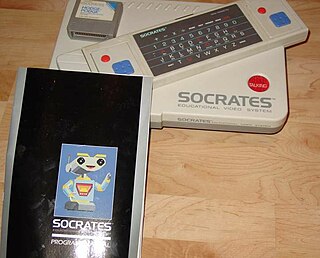
An educational video game is a video game that provides learning or training value to the player. Edutainment describes an intentional merger of video games and educational software into a single product. In the narrower sense used here, the term describes educational software which is primarily about entertainment, but tends to educate as well and sells itself partly under the educational umbrella. Normally software of this kind is not structured towards school curricula and does not involve educational advisors.
Eleanor Ruth Duckworth is a teacher, teacher educator, and psychologist.
Learning through play is a term used in education and psychology to describe how a child can learn to make sense of the world around them. Through play children can develop social and cognitive skills, mature emotionally, and gain the self-confidence required to engage in new experiences and environments.
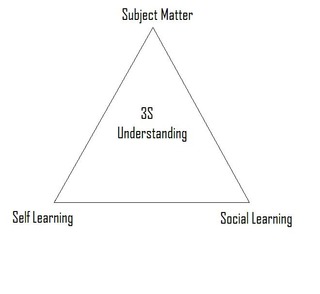
3S Understanding is a curriculum structure that was created by James G. Henderson. 3S Understanding is a mixture of three components that can be diagrammed as a triangle. The three Ss are Subject Matter, Self-learning, and Social Learning.








